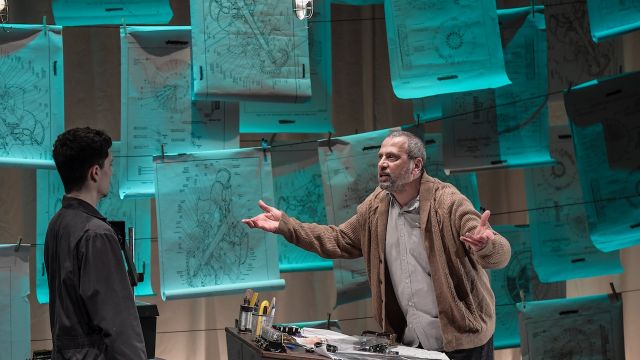Grey Rock
In 2018 Palestinian playwright and director Amir Nizar Zuabi brought his play Azza, which explored the mourning ritual of the same name, and delighted and challenged the understanding of Adelaide Festival audiences. Once again Zuabi, with Grey Rock, proves himself to be an extraordinary theatre craftsman and a passionate and evocative story teller.
In times when war and longstanding conflicts are often treated in media, film and the Arts with violence, and graphically disturbing words and visuals, a piece of theatre that underlines the role of ordinary people in Palestine, where the West Bank, including East Jerusalem, and the Gaza Strip is currently occupied by Israel, is enlightening and amazingly powerful. It underlines the fact that even when things seem impossible, we can dream.

Yusaf, played by internationally renowned actor Khalifa Natour, is an elderly man who loved his wife deeply and has not recovered from her death. In a soliloquy to her he says, “When everyone was conquering space, you were conquering my heart. You were my gravity.” Already jailed once as a political dissident, rather than being cowed by political impotence, he decides to build a 35 metre rocket in his back shed because he believes that Palestine, the land of prophets, should have a place on the grey rock, the moon. Natour epitomises everything that a finely skilled and mesmerising actor brings to the very best performances. His style is naturalistic, his projection, diction, pauses and planting of lines is precise and so believable that one feels they are eavesdropping on private conversations.
His relationship with Palestinian actress and writer Fidaa Zaidan, from the Galilee region of Palestine, who portrays his deeply loyal daughter, Lila, is warm, funny and totally credible. Indeed, each one ‘becomes’ the parent and child for the one hour and 40 minutes of the story. Her performance is standout.

Yusaf’s dream is, of course, ridiculous and politically foolhardy but the American moon landing impressed him and captured his imagination so much, when he saw the hope and pride that it brought to ordinary people, that he decides to make that his dream. The first person to realise his crazy plan is Fadel, played by Luca Kamleh Chapman, born in South West London to a Syrian/Palestinian mother and British father. To complicate matters, Fadel is also hopelessly in love with Yusaf’s daughter, Lila.
Having had a childhood full of uncertainty, Lila decides to marry well-to-do young Jawad, played by Palestinian actor and stand-up comic Alaa Shehada. She decides that her life will be about his dreams, not hers, but she will be safe.

When Yusaf works out that he will need help with his rocket building, he recruits his devout relative played by Motaz Malhees as Sheik and gradually as more and more of the small village become involved, hilarity, chaos and life changing transformations occur.
Whilst the acting is captivating, credit must also be given to the Production Team. The production design by Tal Yarden and Muaz al Jubeb’s lighting are clever, adding interest, relevance and mystery and the use of an epidiascope as a lighting tool and as part of illustrating the story for the audience is inspired. The use of social media multi screens when Yusaf’s quest becomes the most followed hashtag in the world is both poignant and a powerful reminder of story sharing in our modern world.

The choreography, particularly the fight scene between Jawad and Fadel, is carefully orchestrated and powerful in this story of love both lost and found.
I could not help but wonder what this story would convey were it to end a little earlier and with a slightly less obvious outcome, but I left the theatre fully satisfied with Yusaf’s words of love to his daughter ringing in my ears, “I love you more than my skin.” And I felt pretty much like that about this beautiful story.
Jude Hines
Photographer: Roy VanDerVegt
Subscribe to our E-Newsletter, buy our latest print edition or find a Performing Arts book at Book Nook.

